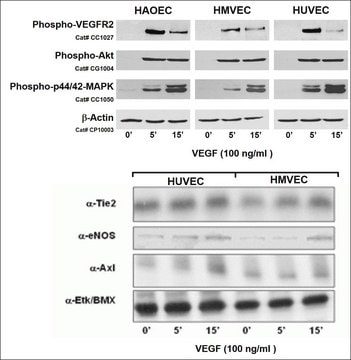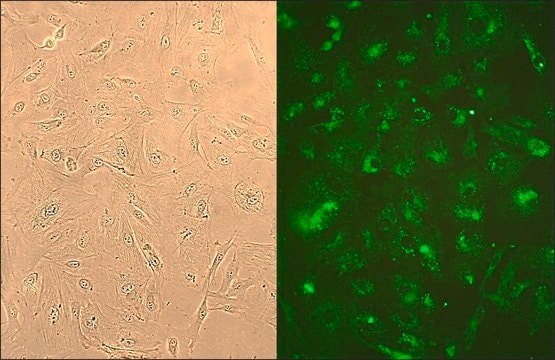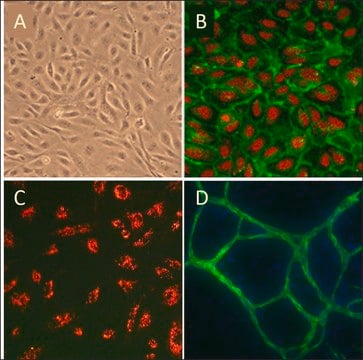540-05A
Human Lung Microvascular Endothelial Cells: HLMVEC, adult
Synonym(s):
HLMVEC, HLMVEC cells
About This Item
Recommended Products
biological source
human lung (normal)
Quality Level
packaging
pkg of 500,000 cells
manufacturer/tradename
Cell Applications, Inc
growth mode
Adherent
karyotype
2n = 46
morphology
Endothelial
technique(s)
cell culture | mammalian: suitable
relevant disease(s)
metastasis
shipped in
dry ice
storage temp.
−196°C
General description
The pulmonary vasculature is of great physiological/pathological significance. It is now recognized to be a tissue composed of metabolically active, functionally responsive cells, that interact with circulating substrates and regulate the composition of systemic arterial blood, affect target organ functions, and contribute to thrombosis, hemostasis and immune reactions, as well as tumor metastasis. Human Lung Microvascular Endothelial Cells (HLMVEC) provide a useful tool for studying various aspects of pathology and biology of the pulmonary microvasculature in vitro.
HLMVEC have been used to elucidate the therapeutic effects of Angiotensin I-converting enzyme (ACE) inhibitors, and the results revealed that they provide an additional benefit to patients by activating bradykinin B1 receptor leading to prolonged nitric oxide (NO) production in endothelial cells and inhibition of PKCε (Ignjatovic, 2004; Stanisavljevic, 2006).
Cell Line Origin
Application
Components
Preparation Note
- 3rd passage, >500,000 cells in Cell Basal Medium containing 10% FBS & 10% DMSO
- Can be cultured at least 15 doublings
Subculture Routine
Disclaimer
Storage Class Code
11 - Combustible Solids
WGK
WGK 3
Flash Point(F)
Not applicable
Flash Point(C)
Not applicable
Choose from one of the most recent versions:
Certificates of Analysis (COA)
Sorry, we don't have COAs for this product available online at this time.
If you need assistance, please contact Customer Support.
Already Own This Product?
Find documentation for the products that you have recently purchased in the Document Library.
Customers Also Viewed
Protocols
Technical information for working with human lung microvascular endothelial cells including thawing, subculturing and cryopreservation
Technical information for working with human lung microvascular endothelial cells including thawing, subculturing and cryopreservation
Technical information for working with human lung microvascular endothelial cells including thawing, subculturing and cryopreservation
Technical information for working with human lung microvascular endothelial cells including thawing, subculturing and cryopreservation
Our team of scientists has experience in all areas of research including Life Science, Material Science, Chemical Synthesis, Chromatography, Analytical and many others.
Contact Technical Service












